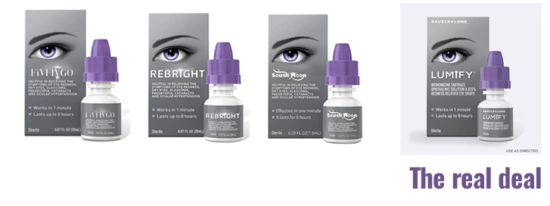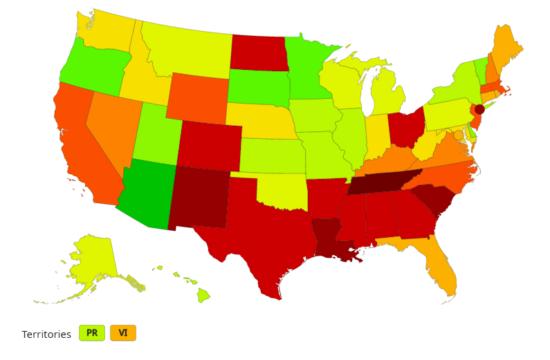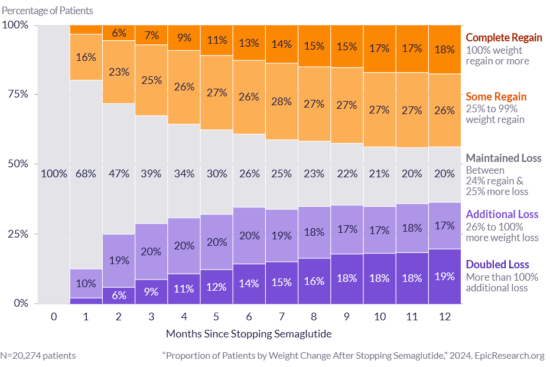February 08, 2024 ✒ Andrew Kantor
People are being overcharged for Paxlovid, and HHS wants pharmacists to help it stop. Sure, the list price of Paxlovid is $1,400, but no one should be paying that — Pfizer has co-pay assistance programs. The trouble is that (at least anecdotally) some pharmacy staff aren’t telling patients about that option. Health and Human Services Secretary Xavier Becerra “made it clear that no patient should be charged hundreds of dollars for Paxlovid at the pharmacy counter,” according to a readout of this week’s meeting with leaders from CVS, Walgreens, Walmart, Rite Aid and Kroger. The Biden administration has an agreement with Pfizer that no one should be paying at all for Paxlovid. “Medicare and Medicaid enrollees can receive Paxlovid for free through 2024, and uninsured individuals can receive Paxlovid for free through 2028.” There’s likely nothing sinister going on here; staff may simply be unaware of the options, and HHS wants to make sure that changes. First they were for diabetes, then for weight loss. Now at least two of the new GLP-1 drugs have yet another effect: According to Eli Lilly, they can also reduce blood pressure. It’s tirzepatide specifically that the company says cuts BP, and it’s a Goldilocks dosage: Participants taking 10 milligram doses of tirzepatide had the greatest systolic blood pressure reductions (10.6 points), followed by those on 15 milligram doses (8.0 points) and participants on 5 milligram doses (7.4 points). The big caveat: “[T]he researchers aren’t sure if the drop in blood pressure was only due to tirzepatide, or if weight loss and diet change had an effect, as well.” And of course there’s the obvious connection to weight loss. There’s a link between body temperature and depression. It seems (found UC San Francisco psychiatric researchers) that “with each increasing level of depression symptom severity, participants had higher body temperatures.” They don’t know whether depression somehow causes temps to rise, or if a rise in temperature is a factor in depression. What they do think is that there might be a benefit to cooling the bodies of people suffering from depression — by heating them up. A small body of existing, causal studies has found that using hot tubs or saunas can reduce depression, possibly by triggering the body to self-cool, for example, through sweating. But you know the mantra: More research is needed. AIP folks were out in Griffin on the latest leg of their “DIR Hangover Tour” — VP Jonathan Marquess and Member Service Rep Catherine Daniel headed to Wynn’s Pharmacy where they met with co-owner and AIP board member Annette Duncan, PharmD, and talked about the solutions and programs AIP offers independent pharmacies. Co-owners Brett and Annette Duncan; MSR Catherine Daniel; Jasper Eubanks, PharmD; and AIP VP Jonathan Marquess Catherine and Annette talk about indy pharmacy issues This isn’t something you hear often: The HPV vaccine had a 100% success rate. That was in a study of Scottish women, and not a small one, either. It’s based on women who received the vaccine when they were 12 to 13 years old, starting in 2008. The researchers looked at cancer data in 2020, so that’s 12 years cancer free. To be extra-super clear: “[T]here have been no cervical cancer cases to date in fully vaccinated women who were given their first dose at age 12-13 years.” Wow. A Johnson & Johnson employee is suing the company saying it “didn’t make enough effort to get its workers a good deal for prescription drugs,” meaning employees ended up overpaying to the tune of millions of dollars. J&J essentially self-insures rather than paying an insurance company to manage health benefits, which means it falls under the Employee Retirement Income Security Act, aka ERISA, which means it has “a fiduciary duty to prudently manage the funds.” The lawsuit alleged J&J violated the company’s fiduciary duty under ERISA. J&J’s mismanagement of the drug benefits resulted in “higher payments for prescription drugs, higher premiums, higher deductibles, higher coinsurance, higher copays, and lower wages or limited wage growth,” the lawsuit said. As a publication that relies on scientific papers a lot, this is scary stuff. Fake scientific papers — many from China where they take “publish or perish” to an extreme — are flooding academic journals “as increasing numbers of young scientists try to boost their careers by claiming false research experience.” You might think the responsibility to verify work falls on journal editors and reviewers, but they’re only part of the problem. Even honest researchers can inadvertently cite falsified work in their own reviews, meaning the problem spreads. Worse, the result of a fake study can make it into the mainstream. Ivermectin is a great example: Early laboratory studies indicated it could be used to treat Covid-19 and it was hailed as a miracle drug. However, it was later found these studies showed clear evidence of fraud, and medical authorities have refused to back it as a treatment for Covid. Oh, and while it’s easy to blame the problem on Chinese “paper mills,” it’s bigger than that. Check out “The Harvard Professor and the Bloggers” to learn how pervasive fake research is. To get more people to test for sexually transmitted infections, the Brits have experimented with vending machines that offered STI tests. They installed 11 of the machines in two medium-sized cities* and let them do their dispensing thing for a year. These machines dispensed rapid HIV tests and self-sampling kits for other STIs, and the results were quite promising. According to the study, the vending machines were found to be effective and acceptable, especially for individuals who rarely or never get tested. By “effective” they mean the machines dispensed 2,536 kits, and users seemed satisfied: “An impressive 92% of respondents found the machines user-friendly, and a whopping 97% were willing to recommend the service to others,” (We assume that means “Honey, why don’t you use that machine over there before we get * Bristol in the southwest and Brighton and Hove on the south shore, since you askedWhen depression is hot, the 100% vaccine, a twist on drug-pricing suits, and more
Reminder: Paxlovid is free for patients
Eli Lilly: Mounjaro And Zepbound reduce blood pressure, too
People with depression are hot
AIP out and about


HPV vax: 100% success
Is this irony? It might be irony
The fake-research problem
Elsewhere: Brits’ new vending machines
coffee tea?”)
February 06, 2024 ✒ Andrew Kantor
Covid, flu, and RSV activity has been declining for several weeks, but now flu numbers have started to creep up again. And guess which state is on the short list of those with very high activity? Also: CDC estimates that there have been at least 20 million illnesses, 230,000 hospitalizations and 14,000 deaths from flu so far this season. Perspective: That’s the equivalent of having 93 Boeing 737s crash with no survivors — just this season. From the flu. (That’s almost six plane crashes every week.) There’s a new variant of Covid appearing, in case you need to fill a space on your bingo card. This one’s called BA.2.87, and “is probably the most divergence [sic] lineage identified this year.” During the pandemic, the feds made it easier for HHS (specifically the Substance Abuse and Mental Health Services Administration) has now made that rule final — the first time in 20 years there’s been a change like this. Patients will be able to take methadone home, and they’ll be able to start getting methadone or buprenorphine via telehealth rather than in person. Federal health officials cited reports that those flexibilities increased treatment and patients’ satisfaction with their care without notable increases in diversion of methadone, which itself is an opioid. Pregnant women who for obvious reasons want to get off opioids are slightly better off using buprenorphine than methadone, according to a study out of Harvard’s and Stanford’s schools of medicine. Both, of course, are better for the baby than taking opioids, so if methadone is the only option, methadone is what they should take. In three quarters of cancers, a protein called MYC is like a nitro boost for tumor cells. As a UC Riverside researcher put it, “Normally, MYC’s activity is strictly controlled. In cancer cells, it becomes hyper active, and is not regulated properly.” Not regulated properly? Challenge accepted. The issue is that MYC is kind of shapeless, so it’s hard to find a structure to attack with drugs — it’s like trying to get a stranglehold on the Blob. But the Riversidians have developed and improved a peptide that binds to MYC using (as you may have guessed) sub-micro-molar affinity. Once the peptide is in the cell, it will bind to MYC, changing MYC’s physical properties and preventing it from performing transcription activities. They need to work on the delivery system before they can start on the road to making this into an actual drug that might keep tumors at bay. When someone is hospitalized for schizophrenia, they’re often given antipsychotics when they’re discharged. Those can be in the form of a long-acting injection or a daily pill. But it seems that taking the pills is four times more likely to lead to readmission. After 30 days, the readmission rate was 8.3 percent among patients who received oral medication and 1.9 percent among patients who received long-acting injections, which can last anywhere from two weeks to six months. That’s what Rutgers researchers found in a new study of 30-day readmission rates at one hospital. Sure, current treatment guidelines say that injections are preferred, but patients often opt for pills instead for either financial reasons (i.e., insurance coverage) or simple fear of needles. But would they still make that choice if they knew how big the difference was? PediaSure can help kids grow taller according to its maker, Abbott. Heck, it’s “clinically proven”! But a New York City grandmother is suing the company, saying that not only is that nonsense, but that the company knew it too. (She “cited three studies funded by Abbott itself that found no connection between PediaSure and growth in height.”) Grandma says all PediaSure did was make her grandson overweight. Abbott said the case was without merit, but a judge said there was certainly enough evidence that it could go to trial. Get your popcorn. Warning: Adults only, please. What do you get when you mix screwy medical advice, conspiracy theories, anti-Semitism, misogyny, and probably a bit too much time on 4Chan? You get the anti-masturbation movement. No, seriously.The latest kooky health movement, flu resurges, easier opioid treatment made permanent, and more
Flu gets a second wind
Covid note
Opioid treatment rules relaxed
opioid addicts people addicted to opioids to get the treatment they needed. They relaxed the rules so patients didn’t need to see a provider in person to get methadone or buprenorphine.Speaking of opioid addiction
Blocking tumors’ accelerator pedal
For antipsychotics, a needle beats a pill
Lawsuit to watch
Write on
The Non-Pharm Long Read: Oh Come On edition
February 03, 2024 ✒ Andrew Kantor
The FDA is warning about eye drops that are essentially copies of Bausch + Lomb’s Lumify. The packaging is suspiciously similar, and these drops could be contaminated. The brands: FivFivGo, Rebright, and South Moon. The South Moon eye drops were contaminated with Burkholderia cepacia complex, a group of bacteria that could result in an antibiotic-resistant infection. While Rebright testing was negative for contamination, FDA recommends consumers not use this product. Oh, and at least two of them, despite looking like Lumify, were missing the active ingredient. And to raise your eyebrow a bit more, the agency says, “The origin of these products is currently unclear.” And when we says they look like Lumify, we don’t mean there’s a passing resemblance: After all the hullaballoo about Biogen’s Aduhelm med for Alzheimer’s — did it really work? was it worth the $56,000/year price tag? — those worries are gone. Biogen has pulled it from the market. The biotech company will focus on rolling out Leqembi, a newly approved Alzheimer’s drug it developed with Japanese drugmaker Eisai. It also plans to work on a slate of experimental treatments for the disease. * * * Got a salmonella infection in your GI tract? You could of course take antibiotics, or you can slap yourself on the forehead and say, “I could have had a V8!” Tomato juice, it seems, can kill salmonella in the gut thanks to a couple of antimicrobial peptides that destroy the bacteria’s membrane. The researchers said they hope that when the general public, particularly children and teenagers, learns about the outcome of the study, they will want to eat and drink more tomatoes, as well as other fruits and vegetables, because they provide natural antibacterial benefits. In what is likely a shock to absolutely no one, a new report found that… The gross price of insulin in the United States is more than nine times higher than in 33 high-income comparison nations. What was that the pharma companies said about high prices were to pay for R&D? Insulin is 100 years old. Ah, but what about the actual price that’s paid after rebates and kickbacks? Yeah, we’re still getting the shaft: “After estimating gross-to-net discounts for insulin, U.S. net prices remained 2.33 times those in comparison countries.” Here’s an interesting twist about the connection between type-2 diabetes and kidney stones. Diabetics are more likely to get kidney stones (not news), but those who take SGLT2 inhibitors have a much lower risk (news). That’s based on a study out of Mass General of more than 716,000 adults with type-2 diabetes. Patients who began taking SGLT2 inhibitors had a 30 percent lower risk of developing kidney stones than those taking GLP1 agonists and about a 25 percent lower risk than those taking DPP4 inhibitors. The findings were consistent across sex, race/ethnicity, history of chronic kidney disease and obesity. So the question of which patients should take which kind of drug … it’s got a bit more nuance. The good news for Vertex Pharmaceuticals: Its experimental drug, VX-548, was safe and well-tolerated in late-stage trials for treating acute pain. The bad news: It was no better than hydrocodone and acetaminophen. The good news: VX-548 is not an opioid, so there’s little risk of addiction. “If approved, it could achieve annual sales of more than $5 billion, according to analysts.” (Psst: It’s also good for patients.) … is still right twice a day. In this case, the “Sleepy Girl Mocktail” that’s been making the rounds there as a sleep aid actually has some science behind it. The drink is a combo of tart cherry juice, powdered magnesium supplement, and soda water. Tart cherry juice contains melatonin, magnesium can help melatonin production, and the soda water makes it easier to actually drink. You can also try hitting yourself on the head with a hammer, but that was last year’s trend. “A team of University of Wisconsin–Madison scientists has developed the first 3D-printed brain tissue that can grow and function like typical brain tissue.” The UW team at work TikTok gets it right, dangerous copycat eye drops, (bacteria) killer tomatoes, and more
Danger: mysterious copycat eye drops

Much ado about nothing

To-may-to, to-mah-to

Yep, we’re still paying through the nose for insulin
Diabetic kidney stones: Some meds are better
Painkiller news
A stopped TikTok…
Your non-pharma, not-creepy-at-all story

February 01, 2024 ✒ Andrew Kantor
So you get Covid. Blech. If you’re not at high risk for hospitalization, you’re (technically) not eligible for Paxlovid; there’s not a lot for you to do even if the symptoms are bad. You can rest, or you can go about your life potentially putting others at risk. There’s no in-between. Well, not in the US. In other parts of the world there are anti-virals other than Paxlovid that cut the duration of symptoms (and contagiousness) available to the public. Simnotrelvir, for example, is used in China and helps people recover faster, but its maker hasn’t applied for FDA approval. Ensitrelvir is available in Japan where it also shortens the duration of some symptoms and also seems to cut the risk of long Covid — that’s according to an Emory researcher, who also says it might lead to fewer “rebounds.” Ensitrelvir is on the FDA’s fast-track approval pipeline, but there’s no way to know if or when it could be available. Meanwhile the risk of Paxlovid losing its effectiveness hangs over it all. Azurity Pharmaceuticals has recalled one lot of its Zenzedi (dextroamphetamine sulfate) ADHD meds because the bottles contain carbinoxamine. Oops. The recalled lot has the lot number F230169A and an expiration date of June 2025. Azurity said it has not received any reports of serious injury related to the medication swap. Shout-out to the Nebraska pharmacist who noticed the problem. (Ugh. That headline sounds like an academic paper. Sorry.) Anyway, there are apparently a few reasons someone can eat too much, and according to researchers from the Mayo Clinic, the big ones are… “Hungry gut” patients, who tend to snack between meals because food moves quickly through their digestive tract, and “hungry brain” patients, who tend to need additional calories to feel full. (There are also “emotional eaters” and those with a slow metabolism.) A genetic test those Mayoians developed can tell which category a patient belongs to, and that’s important: GLP-1 drugs work best with “hungry gut” patients, while “hungry brain” patients will probably do better with Qsymia. “In our studies, if we find someone who is hungry brain-positive and put them on Qsymia, we get better [results]. And while Wegovy is $1,259 a month, you can get with a coupon Qysmia for $100 and it doesn’t have those ugly side effects.” As one of them points out, although the test costs about $500, it can save a lot more in the long run. “‘We’re not going to solve the obesity crisis by treating 100 million people’ with drugs like Wegovy.” From the 1960s to the 1980s, some children were given cadaver-derived human growth hormone before it was pulled from the market because of potential contamination that led to Creutzfeldt-Jakob disease. That contamination? Amyloid-beta protein. The same stuff that’s associated with Alzheimer’s. In fact, that contamination half a century ago didn’t just cause some patients to develop CJD. It also transmitted Alzheimer’s disease. British researchers found this to be the case in a handful of patients who, decades later, developed Alzheimer’s. It’s disturbing because it … … provides the first evidence of Alzheimer’s disease in living people that appears to have been medically acquired and due to transmission of the amyloid-beta protein. To be clear, those people aren’t contagious. Still, it shows that the protein buildup that characterizes Alzheimer’s can be transferred from person to person — even if one of them is dead. Measles cases continue to appear in the county, and the CDC “urged vigilance among health providers across the U.S.” to watch for symptoms among their patients. Officials have tracked seven cases of measles being brought into the country and two U.S. outbreaks with more than five cases each, the CDC said. Most cases were in young children and adolescents who had not received the measles, mumps and rubella (MMR) vaccine even though they were eligible. As one expert pointed out, “We’re going to see more kids seriously ill, hospitalized and even die. And what’s so tragic about this, these are all preventable.” Syphilis in the US is at the highest level since 1950. Whoa. The US saw more than 207,000 cases of syphilis in 2022 — that’s up 17% from the previous year, and the infection rate (i.e., cases per 100k people) jumped 9%. More heterosexual people are getting it, and so are more newborns. Any way you look at it, it’s a problem. The good news: The rate of new gonorrhea cases fell for the first time in a decade, and chlamydia cases remain relatively flat. Why the discrepancy? They don’t know. There’s more asthma showing up in teenagers in states where marijuana is legal. It’s not that the teens are smoking more (there’s mixed evidence of that) — rather that they’re being exposed to more secondhand smoke, as non-tobacco smokers are indulging a bit of weed. “A healthy lifestyle combined with statin use can improve life expectancy.”Where are our Covid treatments? Plus: when Alzheimer’s is contagious, syphilis on the rise, and more
Covid options are lacking
ICYMI: ADHD med recall
A genetic test for GLP-1 effectiveness
Alzheimer’s transmitted (sort of) human to human
Diseases on the rise
Measles
Syphilis
Asthma
Captain Obvious does his cardio
January 30, 2024 ✒ Andrew Kantor
Women dealing with menopause might consider taking the Polar Bear Challenge. That is, swimming in cold water seems to help with a bunch of typical menopause symptoms. That’s based on a survey of more than 1,100 women by British researchers. The findings showed that menopausal women experienced a significant improvement in anxiety (as reported by 46.9% of the women), mood swings (34.5%), low mood (31.1%) and hot flushes (30.3%) as a result of cold water swimming. The big big caveat: The survey was online and by women who already cold-water swim, so they’re a lot more likely to report their symptoms easing. Still, you might still suggest that someone take a jump in a lake. (Perhaps with different wording, though.) The 2024 Georgia legislative session is moving along, and Melissa Reybold is there. Her latest update covers two bills in particular where GPhA has a horse in the race: One concerns white bagging/brown bagging, while the other covers the idea of selling opioid antagonists via vending machines. Read the details right here. Ketamine’s been in the news a lot as a potential treatment for depression, PTSD, and more. It’s not FDA-approved (yet), but its cousin esketamine is approved for treating some forms of depression. That gets confusing, especially among lay people who don’t realize how important those extra two letters are. (Consider how you’d feel if you landed in Kansas instead of Arkansas, especially during tornado season.) Luckily, the good folks at Medscape have a great overview of the differences between ketamine and esketamine, including how they’re delivered, what they’re approved for, and the issues popping up as clinics offer “treatment” that could be ineffective, dangerous, or somewhere in between. While ketamine and esketamine are chemically related, they are very distinct in terms of their chemical compositions, the FDA-approved indications, dosing, and administration, as well as the level of study and data supporting their safe and effective use. What’s the leading cause of death in the US? If you said “heart disease,” congrats! You’re correct … and you’re in the minority. More than half of Americans didn’t know that, either assuming it was cancer, saying they didn’t know, or picking something else like terrorism, lung disease, exposure to 5G/microchips, or Jewish Space Lasers. That’s from a Harris poll commissioned by the American Heart Association, which, as you might imagine, is trying to raise awareness of heart disease. People with advanced prostate cancer are often given chemotherapy with docetaxel, but after about six months cancer cells can become resistant. What might overcome that resistance? Dicyclomine, the treatment for irritable bowel syndrome. Researchers at Washington State University found that dicyclomine can block a protein on cancer cells called CHRM1. Without CHRM1’s help the cancer loses its resistance, then docetaxel can get back to work. “The effect was pretty dramatic in all the experimental models we tested. And because dicyclomine already has a clinical use, this work has immediate translational potential.” Not only can dicyclomine help docetaxel keep working, it can also allow it to be given in lower dosages, avoiding some of the side effects of chemo. When a prostate cancer patient’s PSA suddenly jumps, that usually means it’s time for hormone treatment to lower testosterone. That’s a good idea, found UC San Francisco scientists — but don’t hold back. Hit the patient with multiple testosterone-blockers and you’ll see better results. Compared to the prostate cancer patients who only received a single drug therapy during their year of treatment, patients who received either one or two additional drugs stayed cancer-free, with low PSA levels, for longer. Positive tests for flu, Covid-19, and RSV are dropping, but there’s still plenty going around. (Just ask the Georgia General Assembly — if you read Melissa Reybold’s update, you know that Covid is causing legislators to reschedule meetings.) The latest CDC data shows Georgia is still seeing high rates of respiratory illnesses (10 on a sale of 1-13) but the numbers are down from their end-of-2023 peak. MIT and Yale researchers have found that drugs called 11beta compounds (which are being tested against cancer) also work against the kidney cysts that develop in certain kidney diseases. That’s because both tumor cells and kidney cysts are particularly susceptible* to oxidative stress and those 11beta compounds push that stress past the breaking point. Tumor cells and kidney cyst cells tend to produce increased levels of free radicals because of the oxidative stress they’re under. When these cells are treated with 11beta compounds, the extra oxidative stress […] pushes the cells over the edge. The treatment actually hits the sweet spot of oxidative stress, adding enough to kill the tumor or cysts but not enough to do damage to healthy cells. “The results also suggest that in patients, treatment with 11beta compounds once every few months, or even once a year, could significantly delay disease progression.” * I just wanted to say that I spelled this right on my first try, which surprised me. Imagine a world where people wore Band-Aid-sized patches on their arms that could deliver whatever meds they needed on demand via microneedles. Then imagine that med delivery could be controlled by a smartphone or computer. Need a painkiller? Boop-beep-boop and you’ve got it. Insulin? Beep-boop-beep, done. That’s the vision researchers at UNC are working towards, with just such a patch they’ve tested on mice (with melatonin) and think “could be the next frontier in treatment of neurodegenerative disorders and neurological injuries.” Even better, because drug delivery would be controlled by computer or smartphone, murder-mystery writers would have a field day with the possibilities of hacking someone’s device. Win-win! Drug delivery by smartphone, ice water vs menopause, boosting prostate cancer chemo, and more
Icy water for hot flashes

Legislative update
Ketamine ain’t esketamine
Death confusion
Prostate cancer updates
Boosting chemo
Go big or go home
Respiratory virus season is easing

The X-for-Y Files: Cancer drug for kidney cysts
A smartphone-based drug patch
January 27, 2024 ✒ Andrew Kantor
Researchers at Cold Spring National Laboratory claim they’ve found the Fountain of Youth — or, rather, that they’ve created it. What they did was reprogram CAR-T* cells so they attack the senescent cells in a mouse’s body. Those are the cells that have worn out and no longer replicate, instead building up like grandma’s plastic-tray collection until they interfere with normal functions and start causing inflammation. The CSNL folks’ treatment is like clearing out grandma’s kitchen cabinets while she’s distracted with “Wheel of Fortune” reruns. But it doesn’t have to be grandma: “If we give it to aged mice, they rejuvenate. If we give it to young mice, they age slower. No other therapy right now can do this.” The cool thing about this technique is that T cells have a long memory, so it’s like hiring a permanent cleaning crew rather than doing a one-time scrubbing. “That single treatment can protect against conditions that commonly occur later in life, like obesity and diabetes.” * Yep, those are the same CAR-T cells used to fight cancer. Three grads of the UGA College of Pharmacy had their businesses named to the university’s 2024 UGA Bulldog 100 list, “which recognizes the 100 fastest growing, alumni-owned businesses.” So a big GPhA congrats to… A high-five for Jill Augustine, associate professor (and director of assessment) at Mercer’s College of Pharmacy who was named a 2024 APhA – APRS fellow. Nice going! Warning: This story involves sex. If that bothers you, you might want to skip to the next one. Ladies, here’s another reason you don’t want Covid — or worse, long Covid: It can lead to sexual dysfunction. A study led by Boston University found that by a host of measures having Covid at any point isn’t good for your sex life. It’s not just a problem while you’re sick (obviously) but even going forward. It’s the viral gift that keeps on giving. But long Covid is the real problem. Women who have had Covid at least once had lower sexual function than those who never had it, but at least they were still “functional*”. Women who had long Covid, though, scored much lower on the Female Sexual Function Index. “Covid-19 infection may be associated with impairment of both cognitive and physiological aspects of sexual function.” Just as the body and mind might take some time to get back to firing on all cylinders when it comes to work, study, and exercise, the same may apply to sex. * Based on “levels of desire, arousal, lubrication, and satisfaction.” Eight lots of Robitussin have been voluntarily recalled for microbial contamination. If Haleon hasn’t been in touch, the link above has the lot numbers to watch for. The anecdotal evidence has hinted that people who take GLP-1 drugs to lose weight will start putting that weight back on as soon as they stop taking the meds. But a new study out of Epic Research found that’s not the case. Two teams studied more than 20,000 patients who lost at least 5 lbs. (⅓ stone) on semaglutide and then stopped taking it for at least a year. The big news: “a majority (56.2%) of patients either remained around the same weight they were at when stopping the medication or continued to lose additional weight.” Yep — they lost additional weight. Only about 18% regained the weight they had lost. The chart breaks it down: Results for liraglutide were almost identical. This means patients might be able to use Ozempic or Wegovy to lose a chunk, then pinkie-promise to eat smart and get some exercise to keep the weight off. Good ol’ propranolol, the blood pressure med, can also reduce anxiety for kids on the autism spectrum. Neuroscientists at the University of Missouri found this after following 69 patients over 3 years. Compared to a placebo group, the participants who received propranolol showed significantly reduced anxiety levels at their 12-week check-up appointments while receiving the medication. It didn’t change the other effects of autism, such as social communication skills, but reducing anxiety was pretty good on its own. It was admittedly a small study, so the authors admit, “This will need confirmation in a larger multicenter trial.” Georgia is one of 12 states that saw more than a 45% increase in Obamacare-marketplace enrollments for 2024. In fact, it was the third year in a row of record enrollment thanks to the pandemic and Congress increasing subsidies for low-income patients. This year’s big jump in particular is due to the number of people kicked off Medicaid last year as part of the post-pandemic ‘winddown’; almost a quarter of enrollees were new to the marketplaces this year. The Defense Department was a bit unhappy with what it found at the White House pharmacy back in 2018. It just released the report from its inspector general. (Link is to the news story. Click here for the report itself (PDF).) We found that the White House Medical Unit provided a wide range of health care and pharmaceutical services to ineligible White House staff in violation of Federal law and regulation and DoD policy. Additionally, the White House Medical Unit dispensed prescription medications, including controlled substances, to ineligible White House staff. Ozempic rebound debunked, long Covid and S-E-X, the fountain of youth inside you, and more
Clean house, live longer
Congrats x 4
And while we’re at it….
Covid, women, and the S word
ICYMI
Most people don’t rebound from Ozempic

Autism, anxiety and … propranolol?
ACA signups
Elsewhere/ICYMI: Pennsylvania Ave. edition
January 25, 2024 ✒ Andrew Kantor
This might be surprising or now: Nicotine patches and e-cigarettes are safe for pregnant women. That’s the conclusion from British researchers looking at babies might be affected if mom was using one or the other to quit smoking. They found that “Regular use of e-cigarettes or nicotine patches by pregnant smokers does not appear to be associated with any adverse outcomes.” The was no notable difference in low birth weight, birth defects, miscarriages, or really any other measure compared to non-vapers. Not surprisingly, both had much better outcomes than smokers. As of this writing, there are still some seats left for the February 25 session of APhA’s Pharmacy-Based Immunization Delivery: A Certificate Program for Pharmacists at the GPhA World Headquarters in Sandy Springs. This is the nation’s 800-lb (363 kg) gorilla of immunization training — the best course you can get, and one that gives you 20 hours of CE credit, a spiffy certificate for your wall, and the impressive line on your CV. The whole shebang is just $349 for GPhA members ($499 for non-members). Note: This is always a popular course, so the sooner you sign up the lower your risk of being left out and laughed at behind your back. Some 42 states (plus DC) had sued Johnson & Johnson, claiming the company had misled consumers about the safety of its baby powder. The company has finally reached a (tentative) agreement to settle them all in one fell swoop for about $700 million. The bad news for J&J is that it had only set aside $400 million for these suits, so it’s going to have to dig a The sort-of good news is that a court has already thrown out one civil verdict against the company because the plaintiffs’ witnesses used “junk science.” Those were popular witnesses for plaintiffs, and they won’t be showing up again. Multivitamins are good for the brain. That is, a third study has confirmed that multivitamins have “a statistically significant benefit” on older folks’ cognition and memory. This meta-analysis, done by Mass General Brigham researchers, went a step further than previous ones by including in-person assessments like cognitive tests (“Who was Fred Flintstone’s wife?”). With those previous studies, more than 5,000 participants were included, so it’s pretty conclusive evidence. [I]nvestigators observed a modest benefit for the multivitamin, compared to placebo, on global cognition over two years. There was a statistically significant benefit of multivitamin supplementation for change in episodic memory, but not in executive function/attention. What’s still up in the air is exactly how multivitamins have their effect. By definition they include a bunch of minerals, so which of them make a difference — well, that’s for another study to figure out. Here are some odd numbers: Per CDC data, as of January 6…. But What the heck? You would people to either get both or get neither; they’re often given at the same time, after all. So why the weird discrepancy, especially when even mild Covid-19 can cause nasty long-term effects? It’s actually a bunch of factors. Read on. You get a microbiome! You get a microbiome! Everything gets a microbiome! Yes, even you, semen, and yours can affect the quality of the sperm you’re protecting. UCLA researchers … …found that one microbe in particular, Lactobacillus iners, may have a direct negative impact on male fertility. Researchers found that men with more of this microbe were more likely to have issues with sperm motility. What they’re hoping is that this might open an avenue for treating some forms of infertility, but of course more research is needed. Jumping onto the “you don’t own it, you just subscribe to it” culture is DermaSensor, whose eponymous skin cancer detector was just approved by the FDA. The device uses artificial intelligence and a light sensor, and a study showed it was 96% accurate in detecting cancer, and had only a 3% false-positive rate. But the kicker is that, in a disturbing sign of the time, dermatologists can’t actually buy the device — they can only subscribe to it “at $199 a month for five patients or $399 a month for unlimited use.” Seriously. We’ll just let this next story speak for itself: “FDA Clears PherDal* Intravaginal Insemination Kit for At-Home Use.” Yes, it’s exactly what you think. * 100 Internet Points if you realized how it’s pronounced. New York City is spending $18 million to work with a non-profit called RIP Medical Debt to wipe out more than $2 billion in unpaid medical bills for the city’s poorer or more debt-saddled residents by buying that debt from hospitals at a deep discount. “No one in New York City, or in America, in 2024, should have to choose between getting the health care they need and paying their rent or buying food to feed their families.”At-home artificial insemination, nicotine is OK for moms, vaccine half-takers, and more
Moms and nicotine
The class is filling
J&J settles state suits
little lot deeper to pay for this. The other bad news is that there are still billions in civil suits pending against the company.More multivitamin goodness
Multivitamins are good for the brain.
Multivitamins are good for the brain.The Long Read: Vaccine Quirkiness edition
The next microbiome
Rent-a-Cancer-Test
A different kind of self-service
Elsewhere: Big Apple, smaller debt
January 23, 2024 ✒ Andrew Kantor
German researchers have found a quick way to determine whether someone is likely to develop diabetes — whether they’re pre-prediabetic, if you will. It’s a simple equation based on a blood test and two numbers: the insulin value and the glucose value. The idea is that neither alone gives enough information, but taken together they rate the “control loop for sugar metabolism” to determine a static disposition index, aka the risk of diabetes. The equation essentially measures the feedback loop between glucose sensitivity and beta-cell function, but the details are beyond us to explain. Good news, though: The full paper is available free for those who want those deets. Good news if your Imodium sales are lagging: Climate change, and the warmer weather it’s bringing, will also be bringing more campylobacteriosis, aka the disease that causes a lot of diarrhea. British scientists looked at the data of a million campylobacteriosis cases in England and Wales over 20 years. Then they cross-referenced the weather data and “found a clear link between illness and climate.” Specifically, when days are longer and temperature or humidity is higher, there’s more of the disease. While day length isn’t going to change (much), the other two … yeah. Exactly why the disease spreads more under those conditions isn’t clear — it could be that Campylobacter bacteria thrive in warmer and wetter conditions, or it could be due to behavioral changes when it’s hot and humid. Either way, expect to see a bunch more. Georgia’s legislative session is going from first gear to second, and Melissa Reybold’s latest legislative update is in. Check it out to keep up with the advocacy team’s season as the preliminary work is being done, especially on a couple of bills we’re watching closely. Needles, schmeedles — an oral form of insulin will begin human trials next year. A team of Norwegian and Australian biochemists has developed a nanoscale coating* for insulin that’s got a few tricks up its metaphorical sleeves. First, it keeps the insulin from being digested by stomach acids. Second, it’s broken down by liver enzymes. But the coolest part is that it’s broken down by specific enzymes that are only present when blood glucose is high. “This means that when blood sugar is high, there is a rapid release of insulin, and even more importantly, when blood sugar is low, no insulin is released.” It’s been tested successfully on worms, mice, rats, and baboons. Human trials will start next year, and they hope to have a commercial product ready by 2026 or ’27. But wait, there’s more! It doesn’t need to be refrigerated, and rather than a capsule, it was incorporated into a sugar-free chocolate. (Said the team leader, “This approach was well received.”) * As you probably guessed, it’s a chitosan and glucose copolymer that’s applied to insulin bound to silver sulfide (Ag2S) quantum dots. Obviously. If you breathe through your mouth, you might not live as long as nose breathers. That’s the conclusion we decided to reach after reading about Florida State researchers’ small study (20 people). That study found breathing through the nose had some cardiovascular benefits, not to mention being less embarrassing. The research team found that the volunteers’ diastolic blood pressure was lower when they breathed through the nose […] In addition, nasal breathing shifted the nervous system into a more parasympathetic state (“rest and digest” rather than “flight or fight”) during the rest condition. The differences weren’t huge, and the study didn’t go into why this was the case, but it’s a boon to grad students as the results, the Floridians say, “justify future longer-term studies in other populations.” If you’re a reasonably healthy person who gets Covid-19, you probably don’t need to worry about hospitalization, so you probably don’t need Paxlovid. But you’ll still want to get better faster. Enter simnotrelvir, an antiviral that Chinese scientists tested on 1,200 “mostly healthy” patients with mild Covid symptoms. They combined it with the protease inhibitor ritonavir for an extra boost, and named the combo Xiannuoxin. Result: Patients taking Xiannuoxin cut about 36 hours off their Covid symptoms, and had a much lower viral load — so they also reduced the spread. While you’re trying to kill cancer, it would also be helpful to keep it from spreading. That can be done by compounds called motuporamines. Those were discovered in the ’90s, but they didn’t quite make it as actual treatments. But now medicinal chemists at the University of Central Florida think they’ve found one (“Motuporamine C”) that — thanks to some tweaks they made to it — will bind to enzymes on cancer cells and keep them from metastasizing. They tested this on mice with an aggressive form of pancreatic cancer. “The compound worked and blocked the spread of these cells to the liver. Thus,” said the lead researcher, “we really have something special.” Now they’re looking for funding to begin pre-clinical trials. Every year the folks at science consultant Clarivate release a list of drugs or almost-drugs to watch, which they named … “Drugs to Watch.” It also includes drug trends to watch, which helps boost it to 96 pages long. What do they think you should watch in 2024? There are 13 of ’em that the company thinks have the potential to become blockbusters in the next five years: If you want the details you’ll need to read the full report, which we’re providing to save you the trouble of filling out the form to get your own copy. Our pleasure.Close your mouth to breathe, the coming diarrhea wave, oral insulin goes to human testing, and more
Easy diabetes prediction
Our number two story
The latest legislative update is out
Oral insulin is almost here
Mouth breathers, take notice
A treatment for mild Covid
Blocking metastasis
Drugs to watch?
January 20, 2024 ✒ Andrew Kantor
GPhA is one of dozens of state* and national pharmacy organizations that signed a letter expressing their concern about Florida’s plan to import some drugs from Canada. The program, they say, “could open the door for harmful and counterfeit drugs to enter our nation’s drug supply, with no evidence that this will result in cost savings for our patients.” How could Canada’s drug supply be harmful, you ask? Aside from the maple flavoring added by law, the issue is the US’s Drug Supply Chain and Security Act — aka “Track and Trace” — that essentially creates a closed drug-distribution system here. It means a bottle’s pedigree can easily be checked, and counterfeiting is much harder. “Canada does not have a similar law,” the letter points out, “leaving our drug supply chain at risk under Florida’s program.” * 43 states plus DC and Puerto Rico, and including our friends at the Georgia Society of Health-System Pharmacists It’s a small advance, but it’s a critical one: Duke researchers working on HIV vaccines have confirmed that their vaccine designed for monkeys can “induce broadly neutralizing antibodies” against HIV. The “broadly neutralizing” is the important bit; it indicates that the antibodies aren’t necessarily monkey-specific. The “antibodies generated in the animals were structurally and genetically similar to the antibodies needed in humans.” The next steps will involve developing it into a vaccine candidate for human testing. Men taking Cialis, Levitra, or Viagra along with a nitrate “had a higher risk of heart failure, early death, and other negative health outcomes” than those taking just the nitrate, according to a Swedish study of more than 60,000 men with a history of heart issues. The issue, it seems, is that both meds can cause a drop in blood pressure, although the study didn’t look at the details. The blood-pressure issue was known, but now there’s Swedish confirmation that yes, taking them both can kill you. But perhaps you’d die happy. There’s a silver lining to the push to vaccinate seniors during respiratory virus season: After they shuffle into the doctor’s office, they tend to stay to get a checkup. “These are seniors, many of whom have not been to the office for a long time, they’ve come back in, they’ve now got vaccinated, their physicians have picked up other things while they’ve been there.” This came from a report by UnitedHealth Group that explained in part why health insurers’ stock prices took a hit — they’re having to pay for all that extra health care. (Of course, it’s an ounce of prevention that’s going to save them in the long run, so everybody wins.) “Seniors Who Smoke Weed & Drive Are Road Hazards: Study” Score one for the anti-vax crowd: More measles outbreaks are happening in the US — the latest are in New Jersey, DC, and Philly* — and experts are expecting more to come as local vaccination rates dip below the level needed for herd immunity. Currently measles is officially “eliminated” in the US, but if outbreaks continue for more than a year we could lose that designation. Our prediction: Eventual lawsuits against anti-vax organizations. * Think that’s up north and Georgia is safe? Think again. It’s not news that marijuana can lead to the munchies. (Just ask the Girl Scouts selling cookies.) But until Washington State University researchers took it upon themselves to, you know, research the issue, we didn’t know why. Now we do. After trying to get mice to smoke tiny joints, the neuroscientists settled for using vaporized cannabis, then scanned their brains. (The mice’s, not their own.) Cannabis, they found, activates certain neurons that are normally dormant. [T]he cannabinoid-1 receptor, a known cannabis target, controlled the activity of a well-known set of “feeding” cells in the hypothalamus, called Agouti Related Protein neurons. […] When these neurons were turned off, cannabis no longer promoted appetite. Quick! Justify this research! It “could pave the way for refined therapeutics to treat appetite disorders faced by cancer patients as well as anorexia and potentially obesity.” But first, more research is needed…. * Agouti Related Protein neurons, since you asked A gastroenterologist at the University of Washington explains how the right foods (and the right gut biome) can let your body make its own GLP-1. Free Ozempic!Why pot causes munchies, Viagra-nitrate danger, Florida plan gets national pushback, and more
Pharmacy orgs: Don’t trust Canadian drugs
Step towards an HIV vaccine
Don’t mix ED and chest pain meds
They come for the vax and stay for the checkup
Captain Obvious avoids the left lane
More measles are coming
Munchies explained

The Long Read: How gut bacteria help with weight
January 18, 2024 ✒ Andrew Kantor
Here’s one way to nudge doctors to be careful how they prescribe opioids: Send them a letter every time one of their patients dies from an opioid overdose, and — and this is important — include “a plan for what to do during subsequent patient visits.” USC researchers already knew that a letter informing prescribers about the death of a patient was effective in cutting prescriptions, but now they found it’s even better to give some advice, too. (Kind of like telling a child, “Don’t give the new puppy a chocolate bar. Give him a dog cookie instead.”) Compared to just a notification… … physicians who received notifications with additional planning guidance reduced prescriptions of opioids by nearly 13%. They also reduced prescriptions of the anxiety medications benzodiazepines by more than 8%. (Side note: You know you can trust the research because the lead author is Doctor Doctor.) Medical University of South Carolina medical researchers found that giving spinal surgery patients a dose of N-acetylcysteine (NAC) during surgery reduced their need for post-surgery opioids. In the 48 hours after surgery, patients who were administered NAC via IV infusion received 19% fewer opioid doses on average than patients who received saline. They had less pain, too, and waited longer to request pain meds. Side note: Some early studies have shown the NAC can keep heroin addicts from relapsing. “Can we stop giving opiates completely?” asked the lead researcher. “Likely not. Can we decrease the amount patients need? We should try.” If you have patients with COPD, they shouldn’t be taking gabapentinoids. Drugs like gabapentin and pregabalin already have a warning about the potential for severe breathing difficulties, but there wasn’t a study on the effects on patients with COPD. Now there is. Researchers at Canada’s McGill University combed through the patient data of more than 13,500 patients with COPD and found that gabapentinoid use was associated with almost a 40% increase in “severe COPD exacerbation.” Notably, problems surfaced on average about 6 months after beginning gabapentinoid treatment, so the association might not come to mind. This coming Friday, January 19, is the deadline for submitting nominations for the 2024 Georgia Pharmacy Association Awards. You have two days to tell us who’s the best pharmacist, technician, or student you’ve ever met. Nominate someone for one, two, or more awards that’ll be presented at the convention on Amelia Island. You haven’t waited too long … yet. It takes just a few minutes to describe why someone is deserving, so please take a few minutes and tell us about that awesome pharmacy pro! University of Iowa biomedical engineers found a surprising thing: Smokers did better on autophagy-inhibitor cancer treatment than non-smokers did. Huh. What was one difference between the two? Carbon monoxide; smokers have a lot more of it in their systems. “[T]his suggested that elevated carbon monoxide might improve the effectiveness of autophagy inhibitors.” So how can they deliver carbon monoxide to test their idea? Sticking mice into an exhaust pipe from a ’72 VW Beetle is one way, but a cooler idea is to concoct a drinkable, gas-entrapping foam where the trapped gas is carbon monoxide. (They went with plan B.) When mice with pancreatic and prostate cancers were fed the carbon monoxide foam and simultaneously treated with an autophagy inhibitor, tumor growth and progression was significantly reduced in the animals. It also worked on human cancer cells in the lab, so maybe “safe, therapeutic levels of CO” can be given to patients taking autophagy inhibitors — via a foam or a few hours on I-85. Flu activity dropped a bit for the first time in a while, according to the CDC. It might be a one-week blip or — hopefully — a sign that the season is finally fading. The disturbing news: 13% of kids (especially girls) have tried a nonprescription drug or supplement for weight loss, and the percentage has been going up over the years. The kids have been using whatever they can — diet pills, laxatives, and diuretics, none of which is good for them (unless, you know, they actually need them). “Not good for them” meaning that using these products actually leads to “low self-esteem, depression, poor nutritional intake, and substance use.” Do we need to explain why they’re doing this? Fine. It’s a combination, say the Aussie researchers who did the study, of … ”. . . low self-esteem, parental influence to lose weight or parental dissatisfaction with weight, self-body dissatisfaction, peer groups who value thinness, and media or social media influences promoting unrealistic beauty standards.” Oh, social media, what haven’t you done for us? Antibiotics, it seems, can lead to little kids turning into, shall we say, ‘larger kids.’ Actually it’s a combo of antibiotics and a high-fat diet. If young kids are exposed to both, they run a greater risk of obesity, adiposity, and metabolic dysfunction. The reason, found Vanderbilt University microbiologists, is good ol’ gut bacteria — specifically, the phenyllactic acid that one Lactobacillus bacteria produces. Phenyllactic acid normally tells the epithelial cells of the intestine to ease up on packaging and secreting fat, but when the bacteria aren’t there to produce it, more fat enters circulation. So could you give kids some phenyllactic acid or Lactobacillus bacteria when they get antibiotics? Maybe. But that, as you can imagine, will require some more research.Who should drink carbon monoxide, the combo that fattens kids, tough love for opioid prescribers, and more
How to cut opioid prescribing
Speaking of opioid use…
Gabapentinoids and COPD don’t mix
Last chance to submit a nomination!

Unexpected cancer-drug booster
Quickie flu update
Kids are all about weight loss (and that’s bad)
Guts, bacteria, fats, and kids





